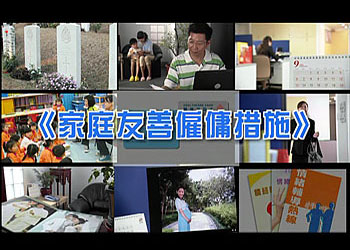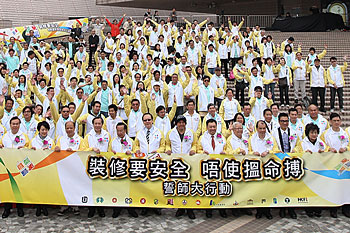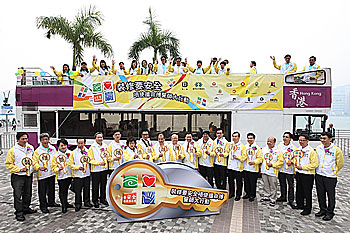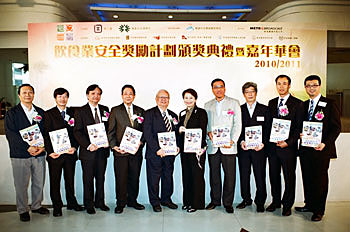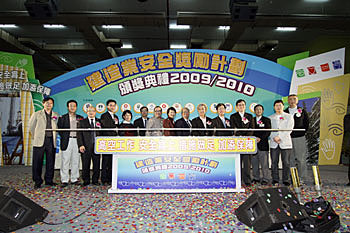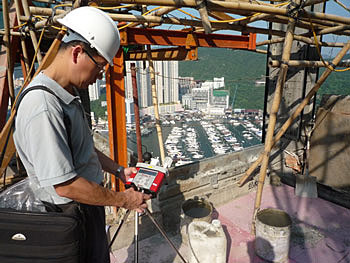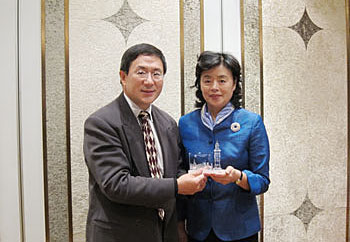Chapter 1 Highlights of the Year 2010
The labour market conditions witnessed widespread and noticeable improvements in 2010, amid the strong pick-up in economic activities and job creation. The unemployment rate came down gradually from 4.4 per cent in the first quarter of 2010 to 4 per cent in the fourth quarter, the lowest level since September-November 2008. We will continue to closely monitor the labour market situation and enhance our employment services on all fronts, especially in netting suitable vacancies from the market and rendering assistance to job-seekers. In the year, we launched a series of new and enhanced measures to provide employment support for job-seekers and to better help the less competitive find work.
Employment Services
Enhanced Employment Services
To help the unemployed re-enter the labour market and respond speedily to the recruitment needs of employers, the Labour Department has put in extra efforts in organising more employment promotion activities at various locations across the territory. A total of 20 large-scale job fairs, 327 mini-job fairs and 30 district-based employment promotion activities were organised in the year. Furthermore, to facilitate the job-seekers in obtaining job vacancy information, the Labour Department has piloted the sharing of vacancy search terminals with non-governmental organisations which provide placement services to the public, in four remote districts in which job centres are not in the vicinity, including Tung Chung, Kwai Tsing, Tseung Kwan O and Island South.
The Labour Department set up a Recruitment Centre for the Retail Industry in June 2010 to provide tailor-made job-matching service and on-the-spot interview arrangements for retail establishments and job-seekers. This is the second industry-based recruitment centre after the Recruitment Centre for the Catering Industry. In 2010, employers of the retail industry offered around 18 960 job vacancies for the centre, and around 13 500 job-seekers attended on-the-spot interviews there.
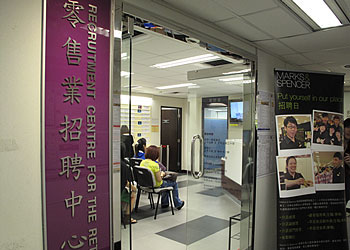
The Labour Department adopts a proactive approach to providing employment assistance. In major business closure or redundancy cases, we set up enquiry hotlines and special counters at our job centres to provide priority job referral and job matching services to the affected employees. In 2010, the Labour Department secured 755 017 vacancies from the private and public sectors and achieved 149 609 placements.
Pilot Employment Navigator Programme
The Labour Department launched a two-year Pilot Employment Navigator Programme in December 2010 to provide in-depth and personalised employment consultation for the unemployed. To encourage the unemployed to land on and sustain employment, a cash incentive will be paid to each unemployed who secures and stays in employment after receiving the employment consultation service under the programme.
Strengthening Employment and Training Support for the Youth
The Labour Department is determined to promote youth employment. Apart from administering youth employment programme to enhance the employability of young people, we also launched in July 2010 a two-year employment project, "Action S5", to render assistance to vulnerable young people aged 15 to 24 with acute employment difficulties.
Labour Relations
Promoting harmonious Labour Relations
In 2010, the Labour Department continued to adopt a proactive and pragmatic approach in helping employers and employees resolve their conflicts through communication, mutual understanding and flexible adjustments. In the year, we handled a total of 68 labour disputes and 20 434 claims. The success rate of conciliation was at a high level of 72.9 per cent. The average waiting time for conciliation meetings was shortened to 2.5 weeks in the year. Besides, the number of working days lost as a result of labour disputes in Hong Kong remained to be among the lowest in the world.
Stepping Up Enforcement Against Wage Offences
In 2010, the Labour Department sustained its all-out efforts to combat wage offences. Territory-wide inspection campaigns targeted at offence-prone trades were launched. To help step up enforcement against wage offences, we collected intelligence on non-payment of wages in various industries through an early warning system in collaboration with trade unions. The department conducted prompt investigation into suspected wage offences and employed veteran ex-police officers to strengthen the investigative work and collection of intelligence to facilitate speedy prosecution.
We continued to step up prosecution against employers and responsible persons of companies for wage offences. We also strengthened our educational and promotional efforts to remind employers of their statutory obligation to pay wages on time and to encourage employees to lodge claims promptly and come forward as prosecution witnesses.
With rigorous enforcement, a total of 1 481 convicted summonses on wage offences were secured in 2010. This represented an increase of 12.7 per cent compared with the 1 314 convictions in 2009. Three company responsible persons and one employer were jailed or given suspended sentences for wage defaults. In addition, five company responsible persons and nine employers were imposed community service orders due to wage offences. An employer was fined $320,000 for committing wage offences.
Enhancing Good People Management Practices and Harmonious Labour Relations
To encourage wider adoption of good people management practices, we organised various promotional activities including seminars, talks and roving exhibitions. In the year, DVDs introducing different types and forms of family-friendly employment practices (FFEP), with exemplary examples to dispel common misconceptions held by employers and the general public, were produced for public distribution. To further promote FFEP to the community, another short video was also produced for broadcasting in public transport.
Employees' Rights and Benefits
Statutory Minimum Wage
The Government introduced the Minimum Wage Bill into the Legislative Council (LegCo) on July 8, 2009. The Bills Committee of the LegCo held a total of 30 meetings to scrutinise the Bill, and the Minimum Wage Ordinance (MWO) was passed on July 17, 2010. The MWO establishes a statutory minimum wage (SMW) regime which provides a wage floor to forestall excessively low wages, but without unduly jeopardising our labour market flexibility, economic growth and competitiveness as well as the employment opportunities for vulnerable workers. A whole range of publicity and promotional activities were launched to familiarise the community with the SMW legislation.
The Provisional Minimum Wage Commission (PMWC), an independent advisory body established in February 2009, was tasked to recommend to the Chief Executive the initial SMW rate on the basis of an evidence-based approach with a view to ensuring a sensible balance between forestalling excessively low wages and minimising the loss of low-paid jobs while sustaining Hong Kong's economic growth and competitiveness. The PMWC comprised a Chairperson and 12 Members drawn from the labour sector, business community, academia and Government. The Chairperson and all the non-official Members were appointed on an ad personam basis. The Labour Department was responsible for providing secretariat support to the PMWC.
The PMWC dutifully accomplished its mission in coming up with the recommendation for the initial SMW rate. The Government adopted the PMWC's recommendation to set the initial SMW rate at $28 an hour. The relevant subsidiary legislation was tabled at the LegCo on November 17, 2010. With the approval of the LegCo, the SMW would come into force on May 1, 2011 i.e. the next Labour Day.
Safeguarding the Rights of Employees of Government Service Contractors
We conducted vigorous inspections to workplaces of non-skilled workers employed by government service contractors in order to protect their statutory rights and benefits under labour laws. In the year, 685 inspections were conducted. We took out prosecution against contractors whenever there was sufficient evidence of breach of the labour laws. With the concerted efforts of the Labour Department and procuring departments in stepping up monitoring and enforcement, the situation of contractors contravening the labour laws has greatly improved.
Applications for Protection of Wages on Insolvency Fund
The Labour Department continued its all-out efforts in clamping down at source on employers evading their wage liabilities, thus preventing wage defaults from developing into claims on the Protection of Wages on Insolvency Fund. Coupled with the continued improvement of the local economy after the financial tsunami, the number of applications for the fund decreased from 7 260 in 2009 to 4 453 in 2010. In 2010, the fund registered a surplus of $404 million, up from $259 million in 2009.
Vigorous Enforcement against Illegal Employment
The Labour Department collaborated with the Police and the Immigration Department to clamp down on illegal employment activities. A total of 217 joint operations were mounted in the year. We also widely publicised the complaint hotline (2815 2200) to encourage the public to report illegal employment activities.
Safety and Health at Work
Safety of Repair, Maintenance, Alteration and Addition (RMAA) Works
There has been a rising trend in industrial accidents related to RMAA works in recent years. With the introduction of the Mandatory Building Inspection Scheme, the Mandatory Window Inspection Scheme, the special operation to remove abandoned signboards and various sponsorship schemes for maintenance of dilapidated buildings by the Administration, the volume of RMAA works is expected to increase.
To enhance the safety performance of RMAA works, the Labour Department continued to intensify enforcement actions to deter unsafe acts by further stepping up inspections of work sites on normal working days, at night and during holidays. Territory-wide blitz campaigns on RMAA works with emphasis on work-at-height and use of electricity were also launched. In these special exercises, 45 suspension/improvement notices were issued and 45 prosecutions were taken out.
On the educational and promotional front, we organised in 2010 a series of intensive promotion and publicity campaigns, targeting work-at-height and RMAA works to arouse the safety awareness of all parties involved. These included launching a two-year publicity campaign in collaboration with the Occupational Safety and Health Council (OSHC) with new initiatives seeking to reach more directly contractors and workers engaged in RMAA works and impress upon them the importance of safety in RMAA works and work-at-height.
We also partnered with the OSHC, District Councils/District Offices, Safe and Healthy Communities in various districts and the property management sector to organise publicity and promotional activities to promulgate work-at-height and RMAA works safety at the district level.
The Labour Department continued to cooperate with the OSHC to operate the Sponsorship Scheme for Work-at-height Fall Arresting Equipment for Renovation and Maintenance Work for small and medium-sized enterprises (SMEs) to assist contractors and employers in need to purchase suitable fall protection equipment to improve the safety standard of work-at-height.
Safety Award Schemes
Two safety award schemes were organised for the catering and construction industries in the year to inculcate a safety culture and to enhance the safety awareness of employers, employees and their families. The schemes featured a variety of activities which included organising safety performance competitions, roving exhibitions, safety quizzes and award presentation ceremonies cum fun days, conducting site visits, producing radio programmes and CD-ROMs as well as broadcasting Announcements in the Public Interest and promotional films on television/radio and "RoadShow".
Prevention of Human Swine Influenza A/H1N1
In the light of the outbreak of human swine influenza A/H1N1 in May 2009, we activated our departmental mobilisation plan to step up inspections of workplaces at a higher risk of infection, including hospitals, clinics, elderly homes, pig farms, slaughterhouses, workplaces of cleansing contractors, boundary control points, restaurants, and schools suspended because of outbreak of the infection, to ensure adequate infection control measures to safeguard the health of employees. The special inspection exercise lasted till the lowering of the response level under the Framework of Government's Preparedness Plan for Influenza Pandemic to "Alert" in May 2010.
Prevention of Heat Stroke at Work
In order to ensure adequate protection of workers from heat stroke at work in summer, we stepped up our enforcement and publicity efforts from April to September. Apart from promoting the awareness of employers and employees of heat stroke prevention, we also developed two specific checklists, one for construction sites and the other for outdoor cleansing workplaces, to provide further guidance for employers and employees in these two industries. Besides, we stepped up our inspections of workplaces with a higher risk of heat stroke. The inspections covered matters such as the provision of adequate drinking water; the provision of sheltered work and rest areas, ventilation facilities; and the provision of appropriate information, instruction and training to workers.
Strengthening Local and International Partnerships
Labour Day Reception
On April 29, 2010, Secretary for Labour and Welfare Mr. Matthew Cheung Kin-chung hosted a cocktail reception at the Hong Kong Exhibition Centre of the China Resources Building to celebrate Labour Day and to pay tribute to the workforce. Acting Chief Executive Mr. John Tsang officiated at the reception, with guests from trade unions, employer associations and other organisations.
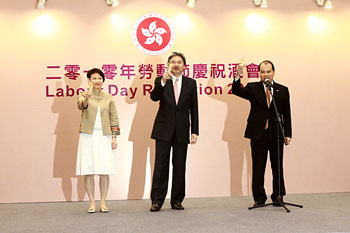
Contacts with Other Labour Administrations
We maintain active liaison and interflows with other labour administrations through visits and participation in various activities.
In June, a tripartite team comprising government, employer and employee representatives attended the 99th Session of the International Labour Conference in Geneva, Switzerland as part of the Chinese delegation.
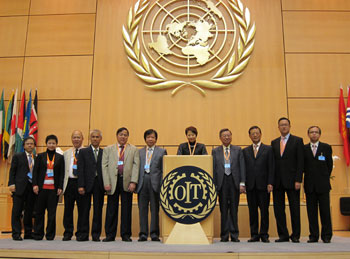
In August/September, Commissioner for Labour Mrs Cherry Tse Ling Kit-ching led a delegation to participate in the 5th China International Forum on Work Safety in Beijing. The event was co-organised by the State Administration of Work Safety and the International Labour Organisation (ILO). The delegation also visited and exchanged views on matters related to labour administration and work safety with the Ministry of Human Resources and Social Security, All China Federation of Trade Unions and China Enterprise Confederation.
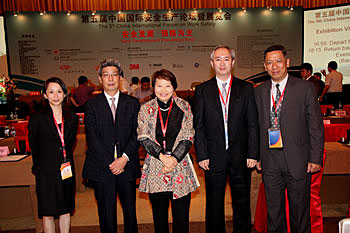
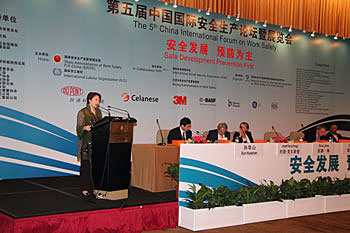
In September, Mr Assane Diop, Executive Director of Social Protection Sector, ILO visited the Hong Kong Special Administrative Region (HKSAR). Mr Diop met with Commissioner for Labour Mrs Cherry Tse Ling Kit-ching and exchanged views with officers of the Labour Department on labour protection and occupational safety and health issues.
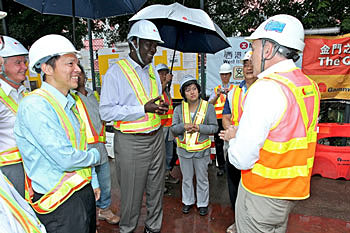
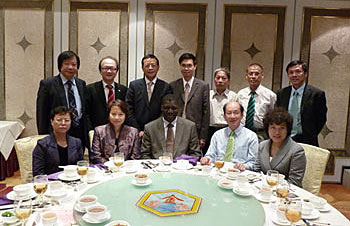
In December, Ms. Zhang Yali, Director-General, Department of International Cooperation, Ministry of Human Resources and Social Security of the State Council, led a delegation to visit the HKSAR under the Reciprocal Visit Programme. The delegation met with the Commissioner for Labour Mr. Cheuk Wing Hing and exchanged views with officers of the Labour Department on various labour issues.
